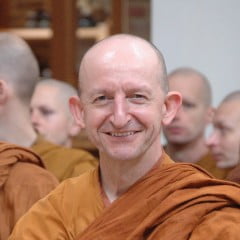This small book is the second in a series of four, consisting of reflections and practices related to the ‘sublime abiding places for the heart’ – the four brahma-vihāras, in Buddhist parlance. The vision for the series is to explore these sublime abidings via the somewhat oblique approach of looking at what counters or muddies their activity. In this second book we will be investigating karuṇā through the lens of that kind of anxious helpfulness that feels like we’re never doing enough, or that wants to fix others so that we will feel better, or the attitude that we don’t deserve ever to feel peaceful or happy while others are still suffering. The other three books in the series similarly explore the remaining brahma-vihāras through aspects of mind and behaviour that oppose or confuse them.

Ajahn Amaro
Born in England in 1956, Ajahn Amaro received his BSc. in Psychology and Physiology from the University of London. Spiritual searching led him to Thailand, where he went to Wat Pah Nanachat, a Forest Tradition monastery established for Western disciples of Thai meditation master Ajahn Chah, who ordained him as a bhikkhu in April 1979. He returned to England in October 1979 and joined Ajahn Sumedho at the newly established Chithurst Monastery in West Sussex.
In 1983 he made an 830-mile trek from Chithurst to a new branch monastery, Harnham Vihāra, near the Scottish border. In July 1985, he moved to Amaravati Buddhist Monastery north of London and resided there for many years. In the early 1990s, he started making trips to California every year, eventually establishing Abhayagiri Monastery near Ukiah, Northern California, in June of 1996.
He lived at Abhayagiri until the summer of 2010, holding the position of co-abbot along with Ajahn Pasanno. At that time, he then moved back to Amaravati Buddhist Monastery in England to take up the position of abbot of this large monastic community.
Arī no Ajahn Amaro

Happily Ever After. 4 Money
2024 — English

Happily Ever After. The Anthology
2024 — English

Happily Ever After. 5 Beyond
2024 — English

Happily Ever After. 1 Reality
2024 — English

Happily Ever After. 3 People
2024 — English

Happily Ever After. 2 Emotion
2024 — English

Navegando Una Sociedad Polarizada
2024 — Español

Hinein-Hören
2024 — Deutsch

Raízes e Correntes
2022 — Português

La Revelación
2022 — Español

Auf den Geist kommt’s an
2022 — Deutsch

อุเบกขา ธรรมสุดท้าย
2022 — ไทย

Serenity Is the Final Word
2022 — English

Cheminer Vers la Paix Intérieure
2022 — Français

L’Écoute Intérieure
2022 — Français

Catastrophe/Apostrophe: L’enseignement du Bouddha sur la...
2022 — Français

突破入流初果
2022 — 中文(简体)

Die Insel
2022 — Deutsch

ทางสายกลาง หรือ ทางสายฉัน
2022 — ไทย

My Way or The Middle Way
2022 — English

Copper Isle Miles
2021 — English

Kāmanīta, el peregrino
2021 — Español

Mind Is What Matters: the Phenomenological...
2021 — English

การให้อภัย และความกรุณา
2021 — ไทย

Forgiving and Compassion
2021 — English

Кто покормит мышей?
2021 — Pусский

Io ho ragione, tu hai torto!
2020 — italiano

ยิ่งน้อย ยิ่งมาก
2020 — ไทย

Less is More
2020 — English

¡Yo Tengo Razón, Tú Estás Equivocado(a)!
2020 — Español

Petit Bateau Grande Montagne
2020 — Français

Solo Uno Más…
2020 — Español

No Empujes – Solo Utiliza El...
2020 — Español

¿Quién Está Tirando De Los Hilos?
2020 — Español

Visión Amplia, Corazón sin Límites
2020 — Español

Solo lo maravilloso permanece
2020 — Español

小乘、大乘、 金剛乘和大道
2019 — 中文(简体)

The Lesser, The Greater, The Diamond...
2019 — English

Emptiness and Pure Awareness
2019 — English

Not Sure!
2019 — English

ไม่แน่!
2019 — ไทย

สุญญตา และการตระหนักรู้อย่างแท้จริง
2019 — ไทย

Mara and the Mangala
2019 — English

สายธารแห่งสายธรรม
2018 — ไทย

A Generous Heart
2018 — English

บุญ
2018 — ไทย

ตามใจมาเติมสุข
2018 — ไทย

Who Will Feed the Mice?
2018 — English

รำลึกซึ้ง
2018 — ไทย

La Isla: Una antología de las...
2018 — Español

Den fehlenden Frieden finden
2018 — Deutsch

L’Ascolto Interiore – Meditazione sul Suono...
2017 — italiano

The Hush At The End Of...
2017 — English

Roots and Currents
2017 — English

¿Quién Alimentará Los Ratones?
2017 — Español

Atammayatā – La última palabra del...
2017 — Español

La Escucha Interior – Meditatión en...
2017 — Español

The Breakthrough
2017 — English

The Pilgrim Kamanita
2017 — English

La Práctica de la Paz Interior
2016 — Español

Who is Pulling the Strings?
2016 — English

Phra Videsabuddhiguṇa (Venerable Ajahn Amaro)
2016 — English

I’m Right, You’re Wrong
2016 — English

Just One More…
2016 — English

For the Love of the World
2016 — English

Finding The Missing Peace
2015 — English

Inner Listening
2015 — English

Inner Listening – Sinhala
2015 — සිංහල

Introduzione Ajahn Chah
2014 — italiano

Piccola Barca, Grande Montagna
2014 — italiano

Rain on the Nile
2013 — English

Tudong, The Long Road North
2013 — English

Rugged Interdependency
2013 — English

An Introduction to the Life and...
2013 — English

Silent Rain
2011 — English

The Island
2008 — English

Like A River
2008 — English

Kleines Boot, erhabener Berg
2007 — Deutsch

Le Pèlerinage de Kamanita
2004 — Français

小船與大山
2003 — zh-TW

Small Boat, Great Mountain
2003 — English

Broad View, Boundless Heart
2001 — English



